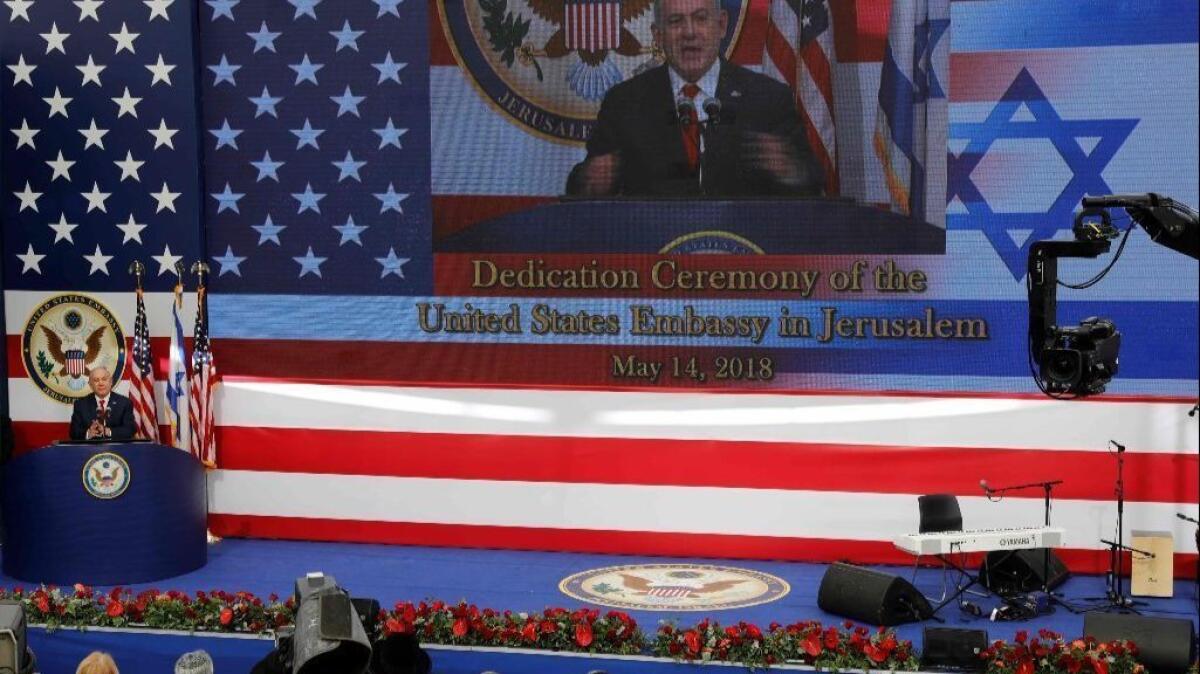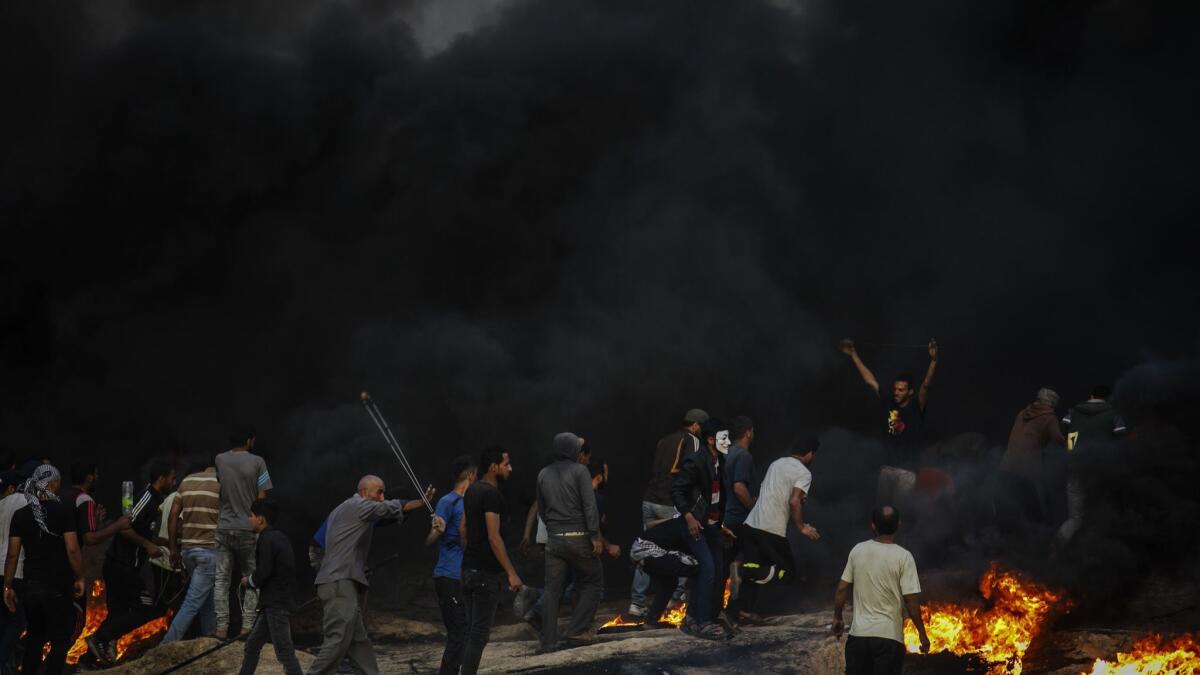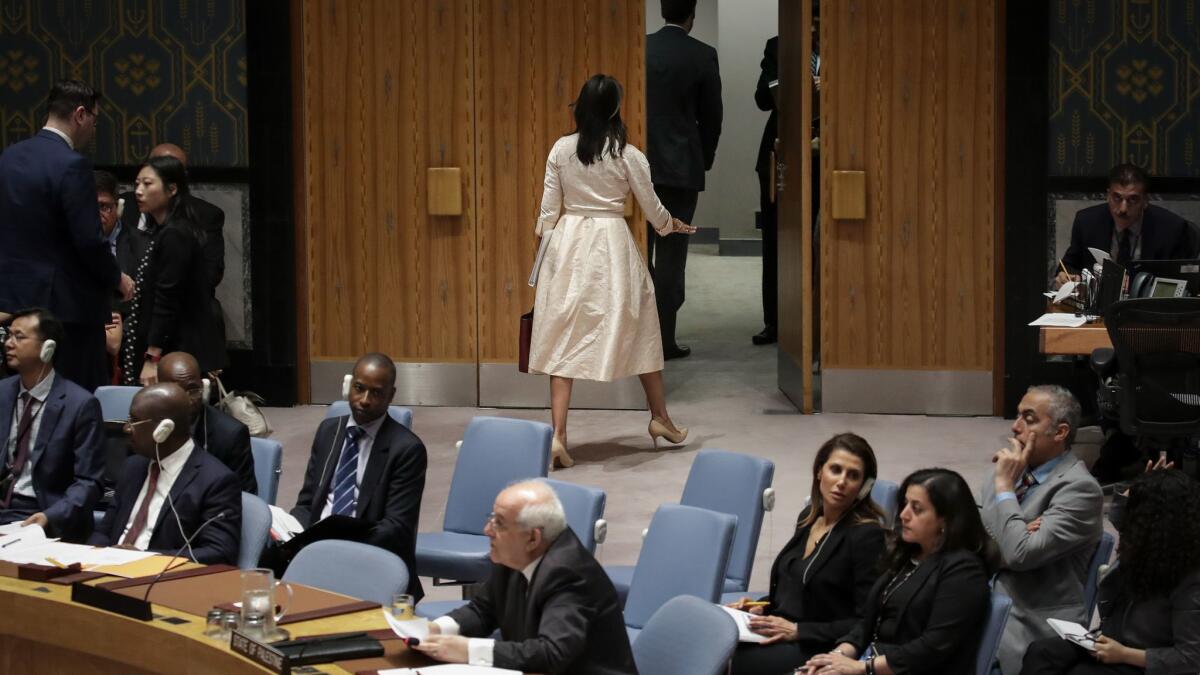Analysis:: Trump administration support for Israel goes beyond its predecessors and isolates U.S. internationally

- Share via
Reporting from Washington — The Trump administration has gone further than any previous U.S. government in expressing full-throated support for Israel in the recent clashes that left dozens of Palestinians dead, isolating itself internationally and further relinquishing its role as a Middle East peace broker.
Administration officials, in a departure from previous American responses to violence between Israeli forces and Palestinians, have not called for restraint on both sides nor condemned the killings.
Instead, they lay the blame entirely on Hamas, the Islamist militant group that governs the Gaza Strip, not commenting on the fact that some of the 55 people shot dead by Israeli forces Monday were children, and that protests were spurred in large part by this week’s opening in Jerusalem of the relocated U.S. Embassy.
In the long, tortuous saga of Israeli-Palestinian relations, U.S. administrations have been consistently pro-Israel. But they have also been careful to show sympathy for the Palestinian cause of statehood and valued their role as a peace broker in the region. At times that has meant chastising Israel and urging restraint.
Those do not seem to figure in President Trump’s foreign policy calculation.
“Rarely have I seen an administration more hostile towards the Palestinians,” said Aaron David Miller, a vice president at the Woodrow Wilson International Center for Scholars and veteran peace negotiator in the Middle East. “What we are seeing is a preternatural effort by the administration to identify itself with the state of Israel and this government of Israel.”
Miller, who served under six secretaries of State in Democratic and Republican administrations, said the approach was unprecedented.
It’s also deliberate. Trump, even more than most conservatives, wears his pro-Israel views as a badge of honor, knowing it brings strong support from powerful donors such as billionaire Sheldon Adelson and a solid core of evangelical Christians.

Although Palestinians had been staging weekly demonstrations at the Gaza border with Israel, the violence surged Monday as Israel held an elaborate ceremony inaugurating the new U.S. Embassy.
Trump’s decision to recognize Jerusalem as the capital of Israel and transfer the embassy to the disputed holy city from Tel Aviv was a highly significant and symbolic diplomatic gesture that came without any apparent conditions or concessions from Israel.
The move has enraged Palestinians and many of Washington’s Arab and European allies. It reversed decades of U.S. and international policy, which left the future status of Jerusalem, claimed by both Israelis and Palestinians as their capital, to be settled during peace talks.
And the timing of the U.S. Embassy opening was particularly provocative, held on the anniversary of Israel’s founding, which every year triggers large protests to honor the hundreds of thousands of Palestinians who fled or were expelled from their land in 1948.
The split-screen views of a beaming Ivanka Trump and her husband, Jared Kushner, at the Jerusalem event, and rock-throwing Palestinians being killed and wounded at the Gaza border were jarring for many people.
The U.S. ambassador to the United Nations, Nikki Haley, went before the Security Council — not only to defend Israel, but also to praise it.
“No country in this chamber would act with more restraint than Israel has,” she said. She walked out when the Palestinian representative took the floor to speak.
Haley also sought to dispel any link between the Gaza killings and the embassy ceremony. “Those who suggest that the Gaza violence has anything to do with the location of the American Embassy are sorely mistaken,” she said.

The most sympathy that any administration official has shown came from State Department spokeswoman Heather Nauert. When repeatedly pressed, she said, “We regret the loss of life; we regret the loss of all life.”
Israel has said many of the casualties were members of Hamas, which has both a political and military wing. A Hamas official acknowledged that some were part of the group.
The United States and Israel came under harsh global condemnation for the embassy move and the killings.
The Trump administration finds itself increasingly estranged from traditional allies in Europe, while it allies with Israel and Saudi Arabia and like-minded Arab states.
The embassy transfer and the reaction to the deaths in Gaza are only the latest steps that diplomats and foreign leaders say have diminished U.S. influence. Just days before the embassy ceremony — which took place 48 hours before the advent of the Muslim holy month of Ramadan — Trump unilaterally withdrew from the hard-fought multinational deal to prevent Iran from developing nuclear weapons.
Trump has also pulled out of other joint efforts, including the landmark Paris climate accord and a Pacific Rim trade pact.
Nile Gardiner, an analyst with the conservative Heritage Foundation, which has advised the White House on foreign policy, said Trump’s approach to Israel and the Middle East is positive and appropriate.
Concern over the danger Iran poses is what firmly unites Trump with Israeli Prime Minister Benjamin Netanyahu, as well as with the Saudi monarchy, Gardiner said.
Trump thinks “Israel is the most important ally and partner in the region,” Gardiner said. “The approach is in keeping with the worldview that Iran is the biggest threat and must be confronted on every front.”
The administration’s attitude toward Palestinians, he said, is not a lack of sympathy but “zero-tolerance” for the Iran-backed Hamas, a group that the United States and the European Union have long listed as a terrorist organization.
Trump has said that he believes “taking Jerusalem off the table,” as he puts it, will in fact promote peace and pave the way for a negotiated solution. He has refused to overtly back the two-state solution of Israel living in peace next to an independent Palestine, long the internationally accepted consensus for resolving the conflict.
Many Mideast experts and diplomats believe the opposite to be true, that peace is more distant than ever. If the provocative moves were part of a broader strategy, the embassy relocation might be an initial negotiating point. But the administration has given no evidence of having a strategy. Trump assigned peace in the Middle East to the young and inexperienced Kushner.
“Peace talks were dead,” said Ian Bremmer, president of the Eurasia Group, which analyzes global political conflicts. “Jared’s likelihood of success was/is roughly the same, if even more implausible.”
Some analysts worry that Israel will interpret the fervent U.S. support — Trump and Netanyahu practically gush over each other — as giving it latitude for any number of actions, including a further crackdown on Palestinians.
U.S. administrations have been reluctant to publicly tell Israel what it must do. Doing so failed miserably under the Obama administration, when the U.S. pressured Netanyahu to temporarily halt construction of settlements in parts of the occupied West Bank.
The freeze failed to put peace talks back on track and Israel continued to build in other disputed areas claimed by Palestinians around Jerusalem.
Under Trump, analysts said, pressure tactics have not even been tried, giving Netanyahu a freer-than-usual hand.
For more on international affairs, follow @TracyKWilkinson on Twitter
More to Read
Sign up for Essential California
The most important California stories and recommendations in your inbox every morning.
You may occasionally receive promotional content from the Los Angeles Times.











